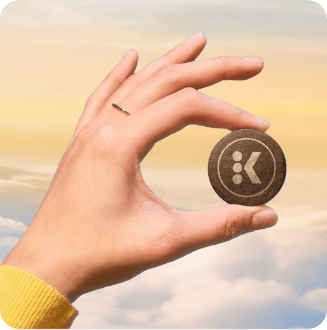Journey of the Keurig® K-Cup® Pod
Keurig Dr Pepper is passionate about every step of the coffee journey. We strive to positively impact the coffee plants, ecosystems and farmers that produce our daily cup, and we continue to responsibly source, roast and package coffee for our owned and partner brands. We have worked to create packaging that is recyclable*, to offer consumers proper guidance on how to do so and to help modernize recycling systems across North America. Read on to learn more about the journey of the K-Cup pod.
1998
The first Keurig® brewing system was commercialized, focused on the office market. The pod was made primarily from polystyrene plastic, chosen to preserve freshness and withstand high temperatures needed in the brewing cycle.
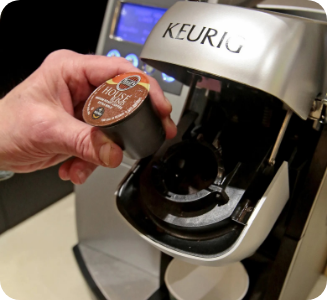
2004
The first Keurig system for
home use was introduced.

2011
Keurig launched the K-Cycle® Commercial Take-back Program to allow large office and commercial venues to collect and return K-Cup pods.
2014
Keurig Green Mountain, now a subsidiary of Keurig Dr Pepper, set a goal to convert 100% of K-Cup pods to a recyclable format by 2020.
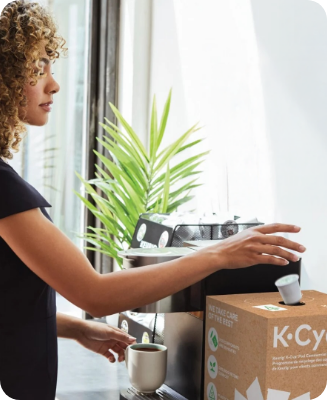
2014-15
Keurig Green Mountain committed $5 million over 5 years as an initial investor to the Closed Loop Fund for recycling solutions and joined The Recycling Partnership to invest in increased access and local education on community recycling in the U.S.
2015-17
Keurig Green Mountain utilized innovative RFID technology to track K-Cup pods made from polypropylene plastic as they moved through 12 recycling facilities in the U.S. and Canada; on average, 90% of pods made it to the container line, with the potential to be recycled.
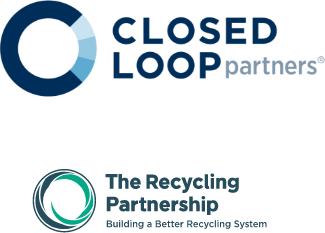
2018
Polypropylene K-Cup pods passed the Association of Plastic Recyclers’ SORT-B-02 size test, proving the K-Cup pod would successfully pass most recyclers’ glass sorting screens.
Resource Recycling Systems – a sustainability consulting firm specializing in circular economy and materials management solutions – conducted access studies that demonstrated the combination of explicit and implicit acceptance for recycling of polypropylene K-Cup pods exceeded 20% in the U.S.
KW Plastics – the world’s largest plastics recycler and supplier of polypropylene recycled resin – recommended recognizing the polypropylene K-Cup pod in the Association of Plastic Recyclers Responsible Innovation Program, highlighting the valuable end market for recyclable polypropylene plastic.
The Association of Plastic Recyclers deemed the polypropylene K-Cup pod “recyclable with detrimental features,” – indicating that the lid should be removed before recycling – and is in alignment with the APR Design® Guide for Plastics Recyclability.
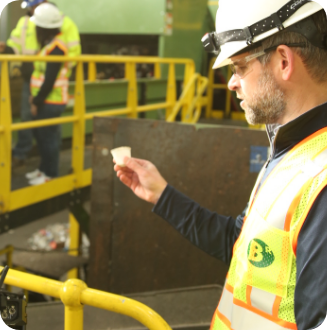
2018-20
KDP completed the transition of all K-Cup pods in Canada and the U.S. to be made from polypropylene plastic and modified its packaging to encourage “recycle right” behaviors. Polypropylene plastic proved to be a material that is food safe and widely accepted in curbside recycling systems across North America, although not all systems that accept polypropylene plastic necessarily choose to accept K-Cup pods.
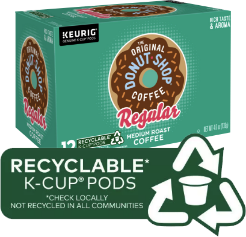
2020
KDP announced its founding sponsorship of The Recycling Partnership’s Polypropylene Recycling Coalition and committed $10 million over 5 years to help increase and improve the recovery and recycling of polypropylene plastic in the U.S.
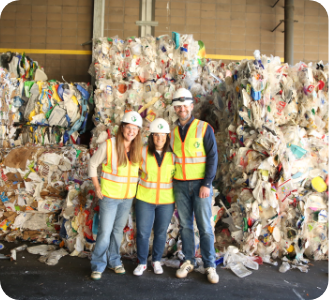
2020-21
KDP Canada co-founded the Circular Plastics taskforce – a group working to optimize plastics recycling – and Circular Materials – a national nonprofit Producer Responsibility Organization that helps producers meet their Extended Producer Responsibility obligations in several Canadian provinces.

2022-23
KDP lightweighted nearly all of its K-Cup pods by reducing the plastic of each K-Cup pod by 18%, compared to the original design.
KDP co-founded the Circular Action Alliance – the only Producer Responsibility Organization approved to implement U.S. Extended Producer Responsibility programs for paper and packaging and designated as the sole Producer Responsibility Organization in California, Colorado, Maryland, Minnesota and Oregon.
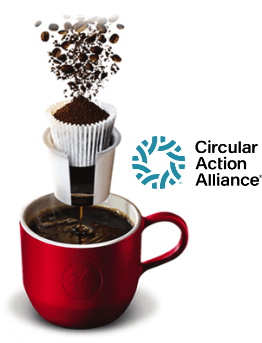
2024
KDP Canada secured acceptance of K-Cup pods into province-run curbside recycling collection programs in Quebec (starting in 2025) and Ontario (starting in 2026), covering 75% of the population.
Keurig launched the K-Cycle® At Home Recycling Program to offer consumers who live in communities that are not currently accepting K-Cup pods in their local recycling programs a mail-back option to return their used K-Cup pods.
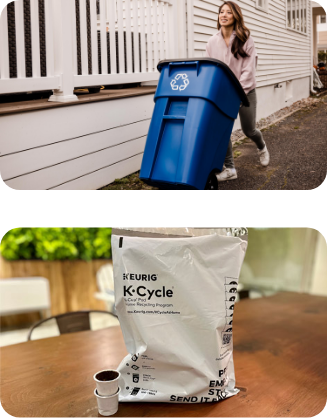
2024-25
KDP announced our vision of a reimagined coffee system with new K-Rounds™ plastic- and aluminum-free pods and the Keurig Alta™ brewer.
The Recycling Partnership’s Polypropylene Recycling Coalition celebrated awarding $22 million in grant funding across 66 facilities to improve recycling infrastructure, capacity and education. This enables nearly 50 million people in the U.S. to have new or improved access to polypropylene plastic recycling over a 5-year period (as of May 2025).
*Check Locally — Not Recycled in Many Communities.
